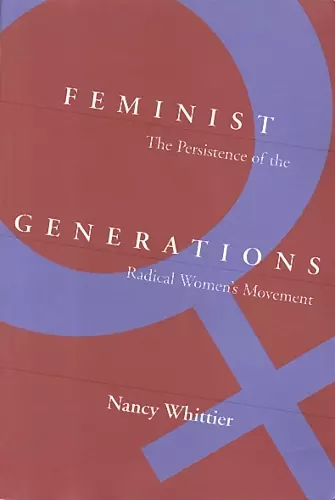Feminist Generations
The Persistence of the Radical Women's Movement
Format:Paperback
Publisher:Temple University Press,U.S.
Published:8th Jun '95
Currently unavailable, and unfortunately no date known when it will be back

Conflict and cooperation between generations of radical feminists
The radical feminist movement has undergone significant transformation from the direct action of the 1960s and 1970s to the backlash against feminism in the 1980s and 1990s. This title traces the changing definitions of feminism as the movement has evolved. It documents subtle variations in feminist identity.The radical feminist movement has undergone significant transformation over the past four decades from the direct action of the 1960s and 1970s to the backlash against feminism in the 1980s and 1990s. Drawing on organizational documents and interviews with both veterans of the women's movement and younger feminists in Columbus, Ohio, Nancy Whittier traces the changing definitions of feminism as the movement has evolved. She documents subtle variations in feminist identity and analyzes the striking differences, conflicts, and cooperation between longtime and recent activists.The collective stories of the women many of them lesbians and lesbian feminists whom the author shows to be central to the women's movement and radical feminism illustrate that contemporary radical feminism is very much alive. It is sustained through protests, direct action, feminist bookstores, rape crisis centers, and cultural activities like music festivals and writers workshops, which Whittier argues are integral and political aspects of the movement's survival.Her analysis includes discussions of a variety of both liberal and radical organizations, including the Women's Action Collective, Women Against Rape, Fan the Flames Bookstore, the Ohio ERA Task Force, and NOW. Unlike many studies of feminist organizing, her study also considers the difference between Columbus, a Midwest, medium-sized city, and feminist activities in major cities like New York, San Francisco, and Chicago, as well as the roles of radical feminists in the development of women's studies departments and other social movements like AIDS education and self-help. Nancy Whittier is Assistant Professor of Sociology at Smith College.
"No one has explored the sources of diversity and 'generational conflict' within movements with more theoretical insight and empirical rigor than Whittier. Her book breaks significant new ground in this regard and serves, as well, as an important addition to the history of the women's movement during the somewhat neglected period of the Reagan years." --Doug McAdam, University of Arizona "This book is both an explosion of the myth of 'postfeminism' and a searching look at the reality of transformations that the women's movement has undergone. In her case study of grassroots feminism in a single city, Whittier demonstrates how understanding continuity and change in the women's movement requires attention to both the collective identities that women have forged for themselves and the persistence of organizations they have founded. She integrates the best of contemporary social movement theory and careful ethnography to provide an insightful account of feminist activism over nearly thirty years." --Myra Marx Ferree, University of Connecticut "At last, a sympathetic account of radical feminism by a scholar/activist from the so-called 'post-feminist' generation. Whittier draws from cutting edge ideas in social movements to illustrate the generational dynamics that have transformed the women's movement. An eminently readable and first-rate book that will change the way we think about the impact of the modern women's movement." --Verta Taylor, Ohio State University
ISBN: 9781566392822
Dimensions: unknown
Weight: unknown
320 pages